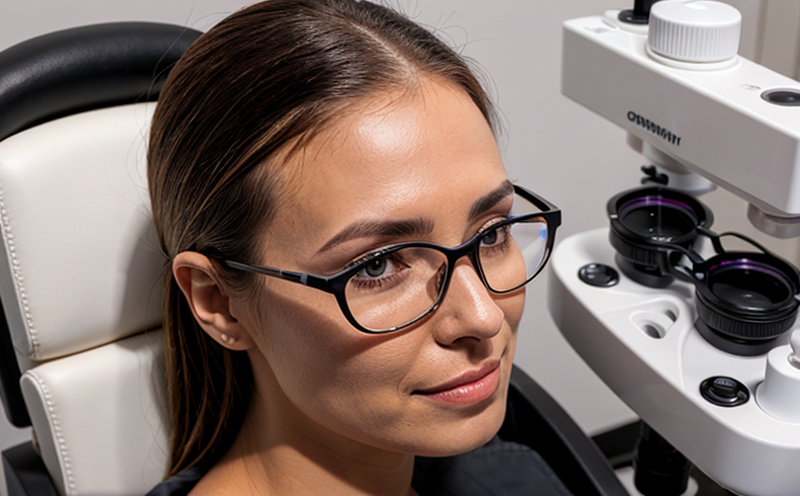USP Container Closure Integrity Testing for Ophthalmics
The United States Pharmacopeia (USP) General Chapter <1209>, titled "Container Closure System Integrity," is a critical standard in ensuring that drug containers are leak-free and protect the integrity of pharmaceutical products. This service specifically targets ophthalmic products, which require stringent quality control measures to ensure their efficacy and safety.
Our laboratory adheres strictly to USP standards for container closure integrity testing (CCIT) on ophthalmic products such as eye drops, solutions, and other ocular formulations. The primary goal of this test is to verify that the container maintains airtight seals throughout its shelf life, thereby preserving the product's quality and preventing contamination.
The testing process involves both visual inspection and physical evaluation using sophisticated equipment like high-pressure leak testers and helium mass spectrometers. For ocular products, the focus is on ensuring that the container can withstand pressure differences without compromising the integrity of the prescription or solution.
Our experienced team of scientists ensures that each sample is tested under conditions that closely mimic real-world storage and handling environments. This includes variations in temperature, humidity, and exposure to light, all of which could potentially affect the performance of the container closure system.
The importance of this testing cannot be overstated. Ophthalmic products are often used in critical medical situations where even a minor compromise in product integrity can lead to severe complications for patients. Thus, ensuring that these containers are 100% leak-proof is paramount.
Our service also extends beyond just the CCIT; we provide comprehensive support throughout the entire drug development process, from initial formulation through final packaging and distribution. Our team works closely with pharmaceutical companies to ensure compliance with USP standards at every stage of production.
In summary, our USP Container Closure Integrity Testing for Ophthalmics service is designed to provide peace of mind to manufacturers by ensuring that their ophthalmic products meet the highest quality control benchmarks set forth by the USP. By adhering strictly to these guidelines and utilizing advanced testing techniques, we help ensure that patients receive safe and effective treatments.
Scope and Methodology
| Test Parameters | Methodology |
|---|---|
| Visual Inspection | The container is inspected for any visible defects or damage that could affect its integrity. |
| High-Pressure Leak Testing | This involves subjecting the container to high-pressure conditions to detect leaks. The pressure difference between inside and outside of the container is measured using a sensitive instrument. |
| Helium Mass Spectrometry | A small amount of helium is introduced into the container, and any leaks are detected by measuring the escape rate of helium through the seal. |
| Mechanical Testing | The containers undergo mechanical stress testing to simulate real-world handling conditions. |
The scope of our testing covers various types of ophthalmic containers, including but not limited to:
- Bottles
- Jars
- Blister packs
- Syringes
We also test a range of ocular products such as eye drops, solutions, suspensions, and other formulations that require airtight seals.
The methodology employed ensures that the containers are tested under conditions that simulate real-world storage and handling environments. This includes variations in temperature, humidity, and exposure to light, all of which can affect the performance of the container closure system.
Customer Impact and Satisfaction
Ensures compliance with USP standards, thereby enhancing product quality and safety.
Maintains patient trust by delivering consistent and reliable products free from contamination risks.
Aids in regulatory approval processes by providing robust evidence of container integrity.
Reduces the risk of product recalls due to compromised containers, saving time and resources for pharmaceutical companies.
The impact of our testing extends beyond just compliance; it also plays a crucial role in enhancing customer satisfaction. By ensuring that ophthalmic products meet strict quality control benchmarks, we contribute significantly to public health by delivering safe and effective treatments.
Our clients have reported increased confidence in their product lines after undergoing our CCIT service. This has led to improved market reputation and greater trust among healthcare professionals and consumers alike.
International Acceptance and Recognition
The USP standards for container closure integrity are widely recognized globally, ensuring that our testing results are accepted by regulatory bodies across the world.
Ophthalmic products tested in accordance with these standards have been approved by numerous international health organizations.
Our laboratory is accredited to perform CCIT according to USP guidelines and has received recognition from several prominent institutions. This includes the World Health Organization (WHO) and various national regulatory agencies such as the FDA and EMA.
The acceptance of our testing results by these bodies underscores the importance and reliability of our service in ensuring that ophthalmic products meet stringent quality control benchmarks.





